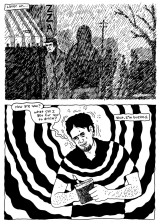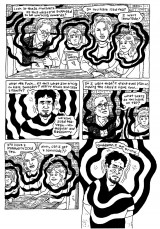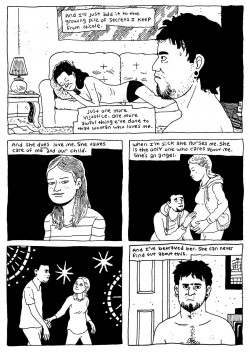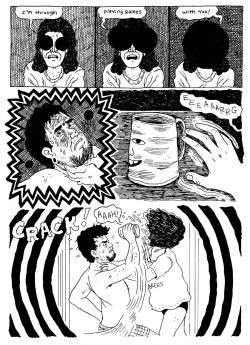Van Sciver's "Saint Cole" Explores The New American Working Class

At nearly thirty years old, Joe is still waiting tables in a pizza parlor. He and his unemployed girlfriend are struggling to raise their unplanned infant son, and now his chronically immature mother-in-law has been forced to move into his too-small apartment.
Maybe that promotion will finally come through for him.
The steady downward spiral of Joe's life unfolds in cartoonist Noah Van Sciver's recently concluded webcomic "Saint Cole." And if you missed it at The Expositor, "Saint Cole" will be getting a print edition in March from Fantagraphics Books.
Van Sciver achieved acclaim for his anthology comic "Blammo" -- a short story from the sixth issue was included in "Best American Comics 2012" -- and his debut graphic novel "The Hypo," a chronicle of pre-Presidential Abraham Lincoln. For "Saint Cole," his second book-length effort, Van Sciver stayed close to home, weaving a fictional tale with plenty of basis in reality for many young people lacking both the financial clout for higher education and the job opportunities needed to carve out a small slice of the American Dream that their parents and grandparents were able to grab.
We spoke with Van Sciver about Joe's opportunities, such as they are, and the real world struggle of the working class to stay motivated and improve their circumstances.
CBR News: I see you've been hanging out in my old hometown. I knew twelve versions of that guy when I was growing up.
Noah Van Sciver: Totally. The main character is based off the kinds of youngish people I'd see in Colorado, or really anywhere in the Midwest. Probably graduated from high school, but not enough money for college. Directionless, with zero skills. The new working class. He's in his late 20s, but he still has to work the kind of job that only teenagers would work years ago. And he has a new family that he has to support from it. It's really a book about being trapped on the bottom rung of society.
Joe and his girlfriend Nicole's relationship is clearly strained from the stress of their circumstances, but she's very multi-faceted and, when push comes to shove, very supportive of Joe. That's a theme around him -- there are people who support and like Joe, but he finds a way to sabotage that backing. How did that theme come up during the development of "Saint Cole."
Well, that's the difference between their characters -- Nicole can deal with things better. She can build something out of nothing, and she tries. Joe is too negative about his life. He's tired and he can't take a break. He can't miss any days of work, because he needs the money. That stuff weighs down on him, heavily. Nicole is staying at home with their baby and probably doesn't have much of a life either, but she's doing the best she can and doesn't wallow as much.
Nicole is much more positive than Joe, you're right. But to be fair to Joe, he doesn't have many opportunities to step back and reflect on his life. Is there even a chance for him, and by extension other people in his circumstances, to consider what he's doing when he's so busy hustling?
Maybe in the middle of the night when he's lying in bed staring at the ceiling. That's a good time.
Toward the end of the book, Joe experiments with meth (after a little coercion) and the story takes on a very trippy quality. For a few pages, you're not sure how much you can trust what you're seeing. That sequence, to me, seemed to show how Joe loses control of situations and can't prevent them from spiraling beyond his control. Anything to that?
Yeah, I think so. I feel like Joe's character is so depressed and numb that he feels like nothing really matters, and he doesn't even see or feel any consequences to any of his actions. He's so numb that he's able to go to those extremes without even feeling any remorse. And maybe he really is after some remorse. He's self-destructive and bitter about being tied down in life. It takes going too far before he is finally able to get some clarity, and by that time, it might be too late.


I like the idea that he's seeking remorse, that's he's become so deadened to his struggles that (not quite consciously) he lets himself make wrong choices to almost force himself out of his circumstances/doldrums. It's a striking commentary on the connection between poverty and depression, isn't it?
Yeah, I think so. I did a good job.
The book has a Steinbeck quality, a chronicle of the working class. Did you have any literary antecedents, or specific people, in mind when you started "Saint Cole?"
It's the boring answer, but, no -- not really. No literary folks in mind, just real life people I've known, the class that I belong to. Once when I was 18, I got a job at McDonalds and I was really embarrassed about it. I was being very self-deprecating about my new job when my brother in-law put me in my place quickly, saying, "You're bringing in money. That's the only thing that matters. You're taking care of yourself." And he was right. He was a character a lot like Joe in some respects. He works his ass off trying to take care of my sister and their children and has a real utilitarian outlook towards life. You adopt that outlook because you have to survive. I'm a drop out; I have no degree, no real skills, and I work day jobs to make ends meet. That's just part of my life. It always will be. These kinds of characters are what interest me because I'm so familiar with them.
You've published lots of short comic stories, but "Saint Cole" is your second full-length graphic novel. Did you set out to create a longer story? At what point did you realize that "Saint Cole" was running over 100 pages?
Yeah, I knew this story would be another book when I started it. I had it all written out and knew pretty much how long it would be and so forth. I was writing this book while I was finishing up "The Hypo."
The book was first published online. Do you approach the story differently when readers will be experiencing only one chapter at a time as compared to the print version where they'll get the entire book at once?
I think the big difference was getting feedback from readers after every chapter was posted. With "The Hypo," for example, I didn't know what anyone would think of what I was doing. I was just working in the dark, really. It was actually interesting to finish a chapter and then hear back from people about it.
What are you working on now?
Right now I'm working on a bunch of illustration work. The main one is a book about Johnny Appleseed that Paul Buhle wrote. I'm a fan of Paul's writing and so it's really great to get to work with him.


